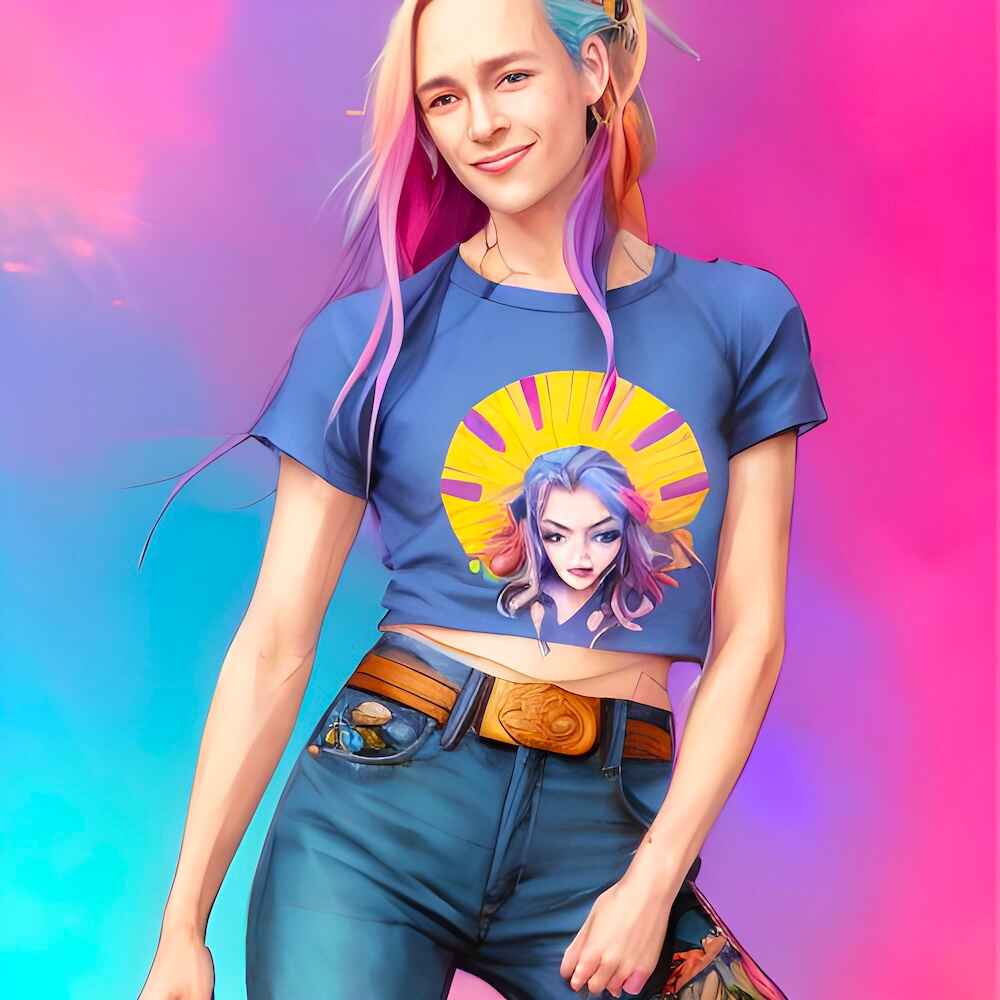“Things are different online, where I feel like I’m fighting a constant war for your attention. I carefully script all of my videos to maximize the addictiveness of each sentence. Beyond the initial hook, I sneak in little micro-hooks to everything I say, making sure to recapture your attention if it does start to drift.”
Adam Aleksic (Gen Z content creator) in his 2025 book, Algospeak
At Oregon Country Fair this year, I spotted something unusual. A young blonde in daisy dukes and a crop top was sitting on a painted carousel horse. She stuck her butt out and looked coquettishly at a professional camera while a woman snapped dozens of photos from all the angles. This thirsty ingenue seemed plucked straight from Coachella, Burning Man, or Euphoria—not our humble hippie fest in the forest! The influencers had finally invaded.
A 2023 Morning Consult Poll found that 57 percent of Gen Zers want to be influencers. I can take a charitable interpretation: perhaps a desire to be known is part of our American cultural DNA. We invented Hollywood; we’re fanatics for professional sports; we’re world-renowned for our marketing and propaganda. Even our current president is more of a twisted showman than a real leader. Fame has infiltrated all aspects of our lives.
But the path to becoming a public figure is what has changed. Attention used to be a result of someone’s skillfulness. In the 90s, everyone knew who Leonardo DiCaprio, Michael Jordan, Britney Spears, and Tyra Banks were. And say what you want about their careers, but they all had immense talent. Wide recognition of a name or face would follow one’s athletic or artistic performance. It might occur with an assist from some savvy PR, but there was typically substance behind a celebrity’s stardom.
These days, why spend time developing your talents when you can simply pay for tens of thousands of Instagram followers? And why do the hard work of finding truth when sensational lies and destructive practical jokes are more likely to go viral?

The primary goal of an influencer is to get your attention. To increase engagement with their content. To amuse, excite, or enrage. To go viral. To gain followers. And to avoid breaking the platform’s rules. In fact, driving engagement is so important that a University of Oxford study found that influencers will minimize their creativity to pander to the algorithm.
Not all influencers are talentless hacks, of course, but there are quite a few desperate clout-chasers who have no skills beyond self-promotion. It’s not their fault that the algorithm rewards braindead megaphones. They’re conditioned to become thirsty loudmouths with no ears, who shout from the digital rooftops, “LOOK AT ME!!!”
And don’t get me wrong: there are many popular influencers I enjoy on Instagram—most of them serve content with cats, hiking, or painting (or some combination of the three). I spent an hour sampling videos from popular creators I’d never heard of: Charli D’Amelio, Addison Rae, Emma Chamberlain, Vinnie Hacker, Reagan Yorke, and others. I feel like I have a hangover after a lobotomy. Or perhaps it’s as if I’ve been eating cotton candy all morning: it’s light, fluffy, irresistible, and will give me serious health problems if I don’t stop. Is anyone else allergic to influencer-speak? The constant WORD EMPHASIS and unnatural intonation remind me of how folks talk to toddlers—only much faster.
I decided it would be less painful to read a book about the phenomena rather than listen to any more of them. Adam Aleksic, a 24-year-old Harvard graduate and “Etymology Nerd” TikTok star, just published an exceptional book called Algospeak. He presents thoughtful reflections on this era and an admirable self-awareness about the bizarre game of algorithmic attention-seeking: “It’s an unfortunate reality that all influencers somehow manipulate your emotions to go viral, since we’re all competing for your attention and we know that your attention is tied to your emotions.”
As Aleksic illustrates, there are still many influencers from whom we can learn skills, build community, or enjoy a laugh. But we should all be wary of whom we follow. Just as we are what we eat, our brains are what we watch and hear. A recent NYTimes opinion piece stated, “Social media platforms are designed to be addictive, and the sheer volume of material incentivizes cognitive ‘bites’ of discourse calibrated for maximum compulsiveness over nuance or thoughtful reasoning.” There’s been talk of a “post-literate” generation, which isn’t an exaggeration: fewer Americans these days are even capable of finishing a two-hour film let alone a 150-page novel. Short videos can broaden our familiarity with a range of subjects in relatively little time, but deep thinking is absent. The medium is the message, indeed.
In other words, if we spend too much time consuming content from low-rent pranksters and hollow pretty faces, we will, as a people, get much stupider. Choose your influencers wisely because you become who influences you.

Skillfulness, talent, and substance have been overshadowed. Thanks for the introspection.
Love your last paragraph. Says it all.
percent true! Advertising/ influencing are not telling you what to think, they are telling you what to think about.
I do enjoy a coquettish pose! Thanks for influencing me!